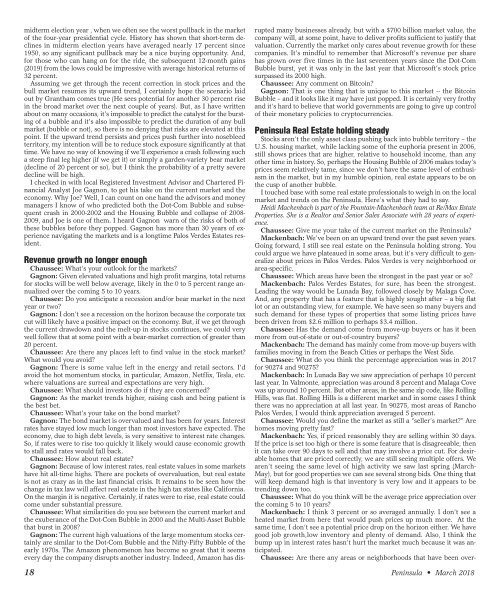Pen People Mar 2018
Create successful ePaper yourself
Turn your PDF publications into a flip-book with our unique Google optimized e-Paper software.
midterm election year , when we often see the worst pullback in the market<br />
of the four-year presidential cycle. History has shown that short-term declines<br />
in midterm election years have averaged nearly 17 percent since<br />
1950, so any significant pullback may be a nice buying opportunity. And,<br />
for those who can hang on for the ride, the subsequent 12-month gains<br />
(2019) from the lows could be impressive with average historical returns of<br />
32 percent.<br />
Assuming we get through the recent correction in stock prices and the<br />
bull market resumes its upward trend, I certainly hope the scenario laid<br />
out by Grantham comes true (He sees potential for another 30 percent rise<br />
in the broad market over the next couple of years). But, as I have written<br />
about on many occasions, it's impossible to predict the catalyst for the bursting<br />
of a bubble and it's also impossible to predict the duration of any bull<br />
market (bubble or not), so there is no denying that risks are elevated at this<br />
point. If the upward trend persists and prices push further into nosebleed<br />
territory, my intention will be to reduce stock exposure significantly at that<br />
time. We have no way of knowing if we'll experience a crash following such<br />
a steep final leg higher (if we get it) or simply a garden-variety bear market<br />
(decline of 20 percent or so), but I think the probability of a pretty severe<br />
decline will be high.<br />
I checked in with local Registered Investment Advisor and Chartered Financial<br />
Analyst Joe Gagnon, to get his take on the current market and the<br />
economy. Why Joe? Well, I can count on one hand the advisors and money<br />
managers I know of who predicted both the Dot-Com Bubble and subsequent<br />
crash in 2000-2002 and the Housing Bubble and collapse of 2008-<br />
2009, and Joe is one of them. I heard Gagnon warn of the risks of both of<br />
these bubbles before they popped. Gagnon has more than 30 years of experience<br />
navigating the markets and is a longtime Palos Verdes Estates resident.<br />
Revenue growth no longer enough<br />
Chaussee: What’s your outlook for the markets?<br />
Gagnon: Given elevated valuations and high profit margins, total returns<br />
for stocks will be well below average, likely in the 0 to 5 percent range annualized<br />
over the coming 5 to 10 years.<br />
Chaussee: Do you anticipate a recession and/or bear market in the next<br />
year or two?<br />
Gagnon: I don’t see a recession on the horizon because the corporate tax<br />
cut will likely have a positive impact on the economy. But, if we get through<br />
the current drawdown and the melt-up in stocks continues, we could very<br />
well follow that at some point with a bear-market correction of greater than<br />
20 percent.<br />
Chaussee: Are there any places left to find value in the stock market?<br />
What would you avoid?<br />
Gagnon: There is some value left in the energy and retail sectors. I'd<br />
avoid the hot momentum stocks, in particular, Amazon, Netflix, Tesla, etc.<br />
where valuations are surreal and expectations are very high.<br />
Chaussee: What should investors do if they are concerned?<br />
Gagnon: As the market trends higher, raising cash and being patient is<br />
the best bet.<br />
Chaussee: What's your take on the bond market?<br />
Gagnon: The bond market is overvalued and has been for years. Interest<br />
rates have stayed low much longer than most investors have expected. The<br />
economy, due to high debt levels, is very sensitive to interest rate changes.<br />
So, if rates were to rise too quickly it likely would cause economic growth<br />
to stall and rates would fall back.<br />
Chaussee: How about real estate?<br />
Gagnon: Because of low interest rates, real estate values in some markets<br />
have hit all-time highs. There are pockets of overvaluation, but real estate<br />
is not as crazy as in the last financial crisis. It remains to be seen how the<br />
change in tax law will affect real estate in the high tax states like California.<br />
On the margin it is negative. Certainly, if rates were to rise, real estate could<br />
come under substantial pressure.<br />
Chaussee: What similarities do you see between the current market and<br />
the exuberance of the Dot-Com Bubble in 2000 and the Multi-Asset Bubble<br />
that burst in 2008?<br />
Gagnon: The current high valuations of the large momentum stocks certainly<br />
are similar to the Dot-Com Bubble and the Nifty-Fifty Bubble of the<br />
early 1970s. The Amazon phenomenon has become so great that it seems<br />
every day the company disrupts another industry. Indeed, Amazon has disrupted<br />
many businesses already, but with a $700 billion market value, the<br />
company will, at some point, have to deliver profits sufficient to justify that<br />
valuation. Currently the market only cares about revenue growth for these<br />
companies. It's mindful to remember that Microsoft's revenue per share<br />
has grown over five times in the last seventeen years since the Dot-Com<br />
Bubble burst, yet it was only in the last year that Microsoft's stock price<br />
surpassed its 2000 high.<br />
Chaussee: Any comment on Bitcoin?<br />
Gagnon: That is one thing that is unique to this market -- the Bitcoin<br />
Bubble – and it looks like it may have just popped. It is certainly very frothy<br />
and it’s hard to believe that world governments are going to give up control<br />
of their monetary policies to cryptocurrencies.<br />
<strong>Pen</strong>insula Real Estate holding steady<br />
Stocks aren’t the only asset class pushing back into bubble territory – the<br />
U.S. housing market, while lacking some of the euphoria present in 2006,<br />
still shows prices that are higher, relative to household income, than any<br />
other time in history. So, perhaps the Housing Bubble of 2006 makes today’s<br />
prices seem relatively tame, since we don’t have the same level of enthusiasm<br />
in the market, but in my humble opinion, real estate appears to be on<br />
the cusp of another bubble.<br />
I touched base with some real estate professionals to weigh in on the local<br />
market and trends on the <strong>Pen</strong>insula. Here’s what they had to say.<br />
Heidi Mackenbach is part of the Fountain-Mackenbach team at Re/Max Estate<br />
Properties. She is a Realtor and Senior Sales Associate with 28 years of experience.<br />
Chaussee: Give me your take of the current market on the <strong>Pen</strong>insula?<br />
Mackenbach: We’ve been on an upward trend over the past seven years.<br />
Going forward, I still see real estate on the <strong>Pen</strong>insula holding strong. You<br />
could argue we have plateaued in some areas, but it’s very difficult to generalize<br />
about prices in Palos Verdes. Palos Verdes is very neighborhood or<br />
area-specific.<br />
Chaussee: Which areas have been the strongest in the past year or so?<br />
Mackenbach: Palos Verdes Estates, for sure, has been the strongest.<br />
Leading the way would be Lunada Bay, followed closely by Malaga Cove.<br />
And, any property that has a feature that is highly sought after – a big flat<br />
lot or an outstanding view, for example. We have seen so many buyers and<br />
such demand for these types of properties that some listing prices have<br />
been driven from $2.6 million to perhaps $3.4 million.<br />
Chaussee: Has the demand come from move-up buyers or has it been<br />
more from out-of-state or out-of-country buyers?<br />
Mackenbach: The demand has mainly come from move-up buyers with<br />
families moving in from the Beach Cities or perhaps the West Side.<br />
Chaussee: What do you think the percentage appreciation was in 2017<br />
for 90274 and 90275?<br />
Mackenbach: In Lunada Bay we saw appreciation of perhaps 10 percent<br />
last year. In Valmonte, appreciation was around 8 percent and Malaga Cove<br />
was up around 10 percent. But other areas, in the same zip code, like Rolling<br />
Hills, was flat. Rolling Hills is a different market and in some cases I think<br />
there was no appreciation at all last year. In 90275, most areas of Rancho<br />
Palos Verdes, I would think appreciation averaged 5 percent.<br />
Chaussee: Would you define the market as still a “seller’s market?” Are<br />
homes moving pretty fast?<br />
Mackenbach: Yes, if priced reasonably they are selling within 30 days.<br />
If the price is set too high or there is some feature that is disagreeable, then<br />
it can take over 90 days to sell and that may involve a price cut. For desirable<br />
homes that are priced correctly, we are still seeing multiple offers. We<br />
aren’t seeing the same level of high activity we saw last spring (<strong>Mar</strong>ch-<br />
May), but for good properties we can see several strong bids. One thing that<br />
will keep demand high is that inventory is very low and it appears to be<br />
trending down too.<br />
Chaussee: What do you think will be the average price appreciation over<br />
the coming 5 to 10 years?<br />
Mackenbach: I think 3 percent or so averaged annually. I don’t see a<br />
heated market from here that would push prices up much more. At the<br />
same time, I don’t see a potential price drop on the horizon either. We have<br />
good job growth,low inventory and plenty of demand. Also, I think the<br />
bump up in interest rates hasn’t hurt the market much because it was anticipated.<br />
Chaussee: Are there any areas or neighborhoods that have been over-<br />
18 <strong>Pen</strong>insula • <strong>Mar</strong>ch <strong>2018</strong>
















